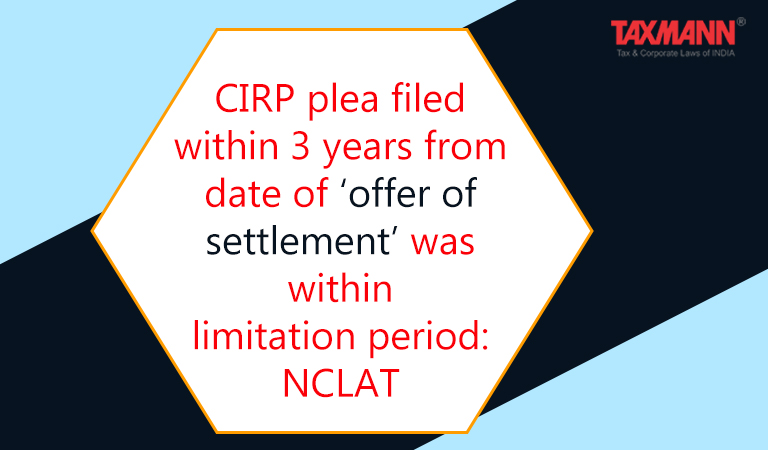CIRP plea filed within 3 years from date of ‘offer of settlement’ was within limitation period: NCLAT
- Blog|News|Insolvency and Bankruptcy Code|
- 2 Min Read
- By Taxmann
- |
- Last Updated on 28 October, 2021

Case details: Vivekanand Jha v. Punjab National Bank - [2021] 131 taxmann.com 221 (NCLAT- New Delhi)
Judiciary and Counsel Details
-
- Justice A.I.S Cheema, Officiating Chairperson and Dr. Alok Srivistava, Technical Member
- Adhitya Srinivasan and Rahul Patel, Advs. for the Appellant.
- Jigar Tarunkumar Bhatt, and Abhinav Thareja, Advs. for the Respondent.
Facts of the Case
In the instant case, the financial-creditor bank had approved various financial facilities to the corporate debtor but the corporate debtor did not pay installments as per agreement. Consequently, the loan of the corporate debtor was declared a non-performing asset on 27-12-2014.
The financial creditor applied section 7 of the Insolvency and Bankruptcy Code, 2016 on 12-12-2019 against the corporate debtor. However, the Corporate debtor raised a defense that the claim of the bank was time-barred.
NCLAT Held
The NCLT, on the other hand, by impugned order admitted said application and found that an Offer of Settlement (OTS) was entered between parties on 29-3-2016, which failed in execution.
Since OTS had been accepted and signed by directors of the corporate debtor, OTS would amount to acknowledgment. Hence, the acknowledgment was there, an application filed on 12-2-2019 was within limitation and, thus, NCLT was justified in admitting application and rejecting the claim of a corporate debtor that the application was time-barred.
Case Review
-
- Innoventive Industries Ltd. v. ICICI Bank [2017] 84 taxmann.com 320/143 SCL 625 (SC) (para 10)
- Sesh Nath Singh v. Baidyabati Sheoraphuli Co-operative Bank Ltd. [2021] 125 taxmann.com 357/166 SCL 507 (SC) (para 13)
- Asset Reconstruction Co. (India) Ltd. v. Bishal Jaiswal [2021] 126 taxmann.com 200/166 SCL 82 (SC) (para 13) followed.
- Punjab National Bank v. Mithilanchal Industries (P.) Ltd. [2021] 131 taxmann.com 220 (NCLT – Ahmedabad) (para 14) affirmed [See annex].
List of Cases Referred to
-
- Innoventive Industries Ltd. v. ICICI Bank [2017] 84 taxmann.com 320/143 SCL 625 (SC) (para 8)
- Sesh Nath Singh v. Baidyabati Sheoraphuli Co-operative Bank Ltd. [2021] 125 taxmann.com 357/166 SCL 507 (SC) (para 8)
- Asset Reconstruction Co. (India) Ltd. v. Bishal Jaiswal [2021] 126 taxmann.com 200/166 SCL 82 (SC) (para 13).
Disclaimer: The content/information published on the website is only for general information of the user and shall not be construed as legal advice. While the Taxmann has exercised reasonable efforts to ensure the veracity of information/content published, Taxmann shall be under no liability in any manner whatsoever for incorrect information, if any.

Taxmann Publications has a dedicated in-house Research & Editorial Team. This team consists of a team of Chartered Accountants, Company Secretaries, and Lawyers. This team works under the guidance and supervision of editor-in-chief Mr Rakesh Bhargava.
The Research and Editorial Team is responsible for developing reliable and accurate content for the readers. The team follows the six-sigma approach to achieve the benchmark of zero error in its publications and research platforms. The team ensures that the following publication guidelines are thoroughly followed while developing the content:
- The statutory material is obtained only from the authorized and reliable sources
- All the latest developments in the judicial and legislative fields are covered
- Prepare the analytical write-ups on current, controversial, and important issues to help the readers to understand the concept and its implications
- Every content published by Taxmann is complete, accurate and lucid
- All evidence-based statements are supported with proper reference to Section, Circular No., Notification No. or citations
- The golden rules of grammar, style and consistency are thoroughly followed
- Font and size that’s easy to read and remain consistent across all imprint and digital publications are applied



 CA | CS | CMA
CA | CS | CMA
